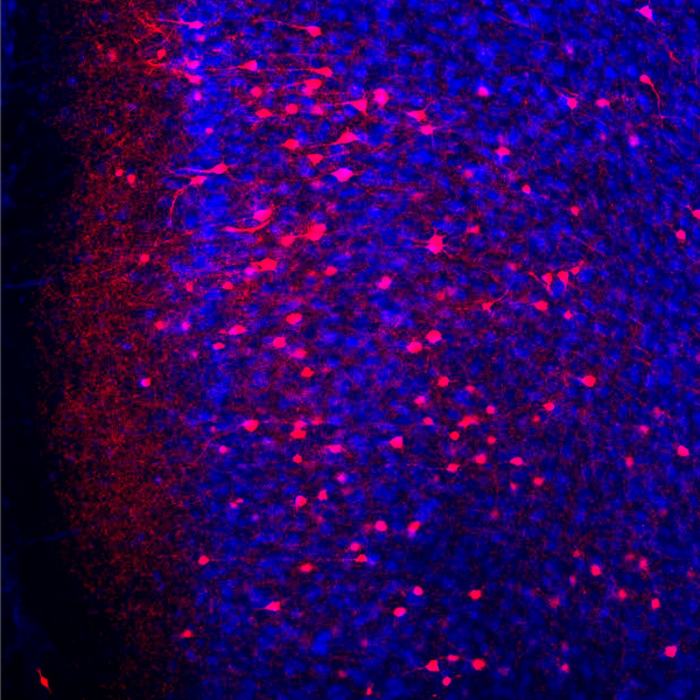RIVERSIDE, Calif. — A remote fear memory is a memory of traumatic events that occurred in the distant past — a few months to decades ago. A University of California, Riverside, mouse study published in Nature Neuroscience has now spelled out the fundamental mechanisms by which the brain consolidates remote fear memories.

Credit: Cho lab, UC Riverside.
RIVERSIDE, Calif. — A remote fear memory is a memory of traumatic events that occurred in the distant past — a few months to decades ago. A University of California, Riverside, mouse study published in Nature Neuroscience has now spelled out the fundamental mechanisms by which the brain consolidates remote fear memories.
The study demonstrates that remote fear memories formed in the distant past are permanently stored in connections between memory neurons in the prefrontal cortex, or PFC.
“It is the prefrontal memory circuits that are progressively strengthened after traumatic events and this strengthening plays a critical role in how fear memories mature to stabilized forms in the cerebral cortex for permanent storage,” said Jun-Hyeong Cho, an associate professor of molecular, cell and systems biology, who led the study. “Using a similar mechanism, other non-fear remote memories could also be permanently stored in the PFC.”
The brain uses distinct mechanisms to store recent versus remote fear memories. Previous studies have suggested that while the initial formation of fear memory involves the hippocampus, it progressively matures with time and becomes less dependent on the hippocampus. Much research now explains how recent fear memory is stored, but how the brain consolidates remote fear memories is not well understood.
The researchers focused on the PFC, a part of the cerebral cortex that has been implicated in remote memory consolidation in previous studies.
“We found a small group of nerve cells or neurons within the PFC, termed memory neurons, were active during the initial traumatic event and were reactivated during the recall of remote fear memory,” Cho said. “When we selectively inhibited these memory neurons in the PFC, it prevented the mice recalling remote but not recent fear memory, suggesting the critical role of PFC memory neurons in the recall of remote fear memories.”
In the experiments, the mice received an aversive stimulus in an environment called a context. They learned to associate the aversive stimulus with the context. When exposed to the same context a month later, the mice froze in response, indicating they could recall remote fear memories. The researchers showed that connections (synapses) between memory neurons in the PFC, termed prefrontal memory circuits, were gradually strengthened with time after fear learning, and such strengthening helped the PFC permanently store remote fear memories.
Next, to extinguish the remote fear memory in the mice, the researchers repeatedly exposed the mice to the same fear-predictive context but without the aversive stimulus. The result was a reduced fear response to the context.
“Interestingly, the extinction of remote fear memory weakened the prefrontal memory circuits that were previously strengthened to store the remote fear memory,” Cho said. “Moreover, other manipulations that blocked the strengthening of the PFC memory circuits also prevented the recall of remote fear memory.”
Cho explained that a dysregulation of fear memory consolidation can lead to chronic maladaptive fear in PTSD, which affects about 6% of the population at some point in their lives.
“Considering that PTSD patients suffer from fear memories formed in the distant past, our study provides an important insight into developing therapeutic strategies to suppress chronic fear in PTSD patients,” he said.
Next, Cho’s team plans to selectively weaken the prefrontal memory circuits and examine whether this manipulation suppresses the recall of remote fear memories.
“We expect the results will contribute to developing a more effective intervention in PTSD and other fear-related disorders,” Cho said.
The study was supported by grants from the National Institutes of Mental Health.
Cho was joined in the study by Ji-Hye Lee, Woong Bin Kim, and Eui Ho Park.
The title of the paper is “Neocortical Synaptic Engrams for Remote Contextual Memories.”
The University of California, Riverside is a doctoral research university, a living laboratory for groundbreaking exploration of issues critical to Inland Southern California, the state and communities around the world. Reflecting California’s diverse culture, UCR’s enrollment is more than 26,000 students. The campus opened a medical school in 2013 and has reached the heart of the Coachella Valley by way of the UCR Palm Desert Center. The campus has an annual impact of more than $2.7 billion on the U.S. economy. To learn more, visit www.ucr.edu.
Journal
Nature Neuroscience
DOI
10.1038/s41593-022-01223-1
Method of Research
Experimental study
Subject of Research
Animals
Article Title
Neocortical Synaptic Engrams for Remote Contextual Memories.
Article Publication Date
23-Dec-2022
COI Statement
The authors declare no competing interests.




